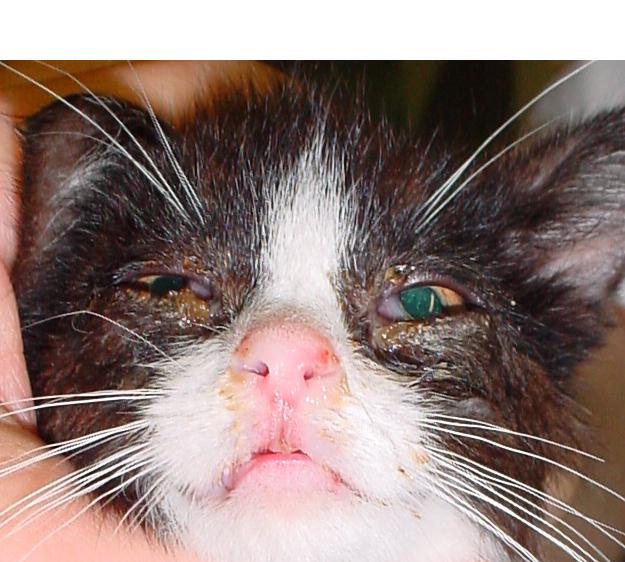Infectious feline rhinotracheitis is a very serious and highly contagious disease that affects the respiratory system of cats, caused by feline herpersvirus virus 1 (HVF-1) and usually affects cats with low immunity.
When the infection is acute, the prognosis is quite reserved; on the other hand, in chronic cases, the prognosis is favorable.
- In this Animal Expert article.
- We’ll explain everything you need to know about feline rhinotracheitis caused by the feline herpes virus.
- Read!.
Feline herpesvirus 1 (HVF-1) is a virus that belongs to the genus Varicellovirus.It affects both domestic cats and other feral cats [1].
This virus contains a double strand of DNA and has a glycoprotein-lipid wrap, making it relatively fragile on the outside and very sensitive to the effects of common disinfectants, so it is very important to clean and disinfect your cat’s house and objects!
This virus can survive up to 18 hours in a humid environment. It rarely survives in dry environments! That is why this virus normally affects the eye, nasal and oral region. It needs this humid environment to survive and these areas are perfect for it.
The most common form of transmission of this virus is through direct contact between infected cats and kittens with low immunity (especially puppies), when kittens are born they have maternal antibodies that protect them, but as they grow they lose that protection and become very susceptible to this virus and another. Hence the great importance of vaccination!
Feline herpesvirus 1 usually affects the upper airways of cats.The incubation period of the virus is 2 to 6 days (the time between the time the cat becomes infected and the onset of the first clinical signs) and the intensity of symptoms may vary.
The main symptoms of the virus are
Eye injuries include:
Viral feline rhinotracheitis is the disease caused by infection with feline herpesvirus type 1, as we have already explained, which, which especially affects young animals, can lead to death, unfortunately it is one of the most common diseases in cats.
Diagnosis is usually made by observing the clinical signs associated with the presence of feline herpesvirus type 1, which we have already mentioned, that is, the veterinarian diagnoses this disease mainly by observing the symptoms and history of the kitten.
In case of doubt, there is laboratory evidence that allows a definitive diagnosis of the treatment of this disease, some of these tests are:
If rhinotracheitis is curable, this is obviously one of the problems that concern the caretakers of animals with this disease. Unfortunately, there is no cure for acute feline herpesvirus infection in all cats, especially kittens, this disease can be fatal. However, there is a treatment and cats with this disease can have a good prognosis if treatment is started in the initial stage of the disease.
Once the diagnosis is made, the veterinarian will prescribe appropriate treatment for the clinical signs of the cat.
Antiviral treatment is a very complicated and time-consuming treatment because the virus lives inside cells and you need to take medications to prevent the virus from reproducing without killing the cells where it is. Ultimately, the veterinarian can use antivirals such as ganciclovir and cidofovir, which have been shown to be effective in controlling this virus [2].
In addition, the use of antibiotics is common, as secondary bacterial infections are very common.
Depending on the clinical signs of the cat, eye drops, nasal decongestants and nebulizations may be prescribed.The most severe cases, in which animals are heavily dehydrated and/or anorexic, hospitalization, fluid therapy and even forced feeding by tube may be necessary.
The best way to prevent feline rhinotracheitis is undoubtedly vaccination, which exists in Brazil and is part of the normal cat vaccination plan.
The first dose of the vaccine is usually applied between 45 and 60 days of the animal’s life and the recall should be annual.However, this may vary depending on the protocol followed by your veterinarian.The most important thing is that you have exactly the vaccination plan that your veterinarian has defined.
Kittens that are not yet vaccinated should avoid contact with unknown cats because they can carry this virus and if active they can transmit it, sometimes signs of the disease are very mild and not easy to detect, especially in chronic carriers of the virus.
Because it is a contagious disease and there is also the herpes virus in humans, many people wonder: does feline rhinotracheitis manifest in humans?The answer is no! You can be sure that this virus is specific to these animals and is not transmitted to humans, it is very contagious but only in cats and by direct contact with the secretions of the eyes or nose, or by indirect contact, as by a sneeze!
We remember that these animals, even after the healing of symptoms, are carriers of the virus that, being dormant, is not contagious, however, as soon as the virus is activated, it becomes a potential contagion.
This article is for informational purposes only, in Animal Expert.com.br we cannot prescribe veterinary treatments or make any type of diagnosis, we suggest that you take your pet to the veterinarian in case of any condition or discomfort.
If you would like to read articles similar to Feline Rhinotracheitis – Feline Herpesvirus, we recommend that you visit our Infectious Diseases section.

